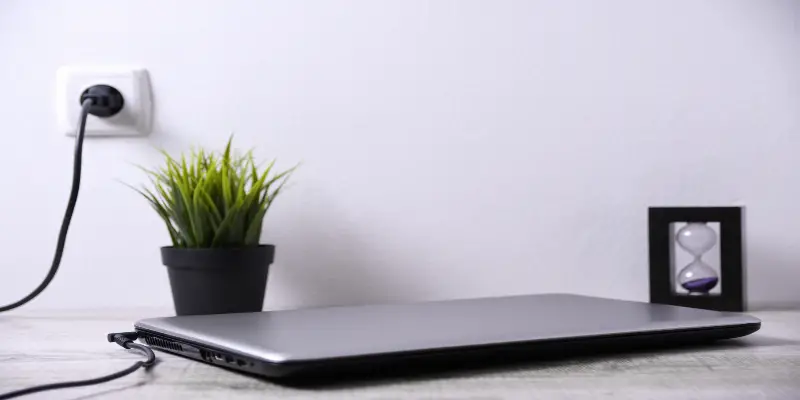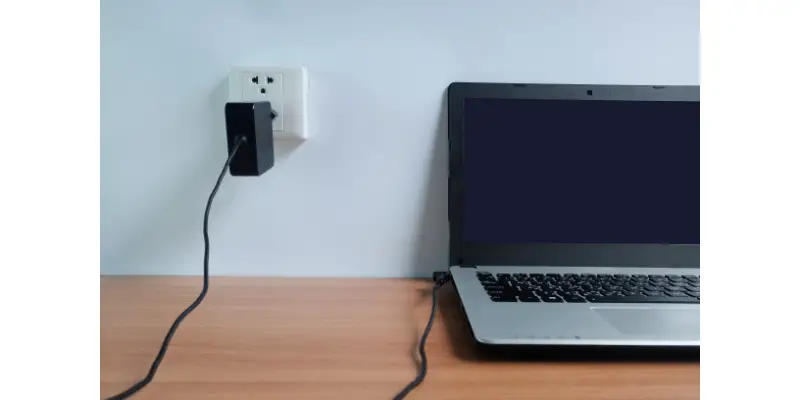Disclaimer: This post may contain affiliate links, meaning we get a small commission if you make a purchase through our links, at no cost to you. For more information, please visit our Disclaimer Page.
There’s a lot of debate about whether or not it’s ok to leave your laptop plugged in all the time.
A laptop that is connected directly uses power from the A/C and not from the battery. Once the charges go below their full capacity, it recharges to its full capacity. There is no risk of damaging the battery by leaving the laptop plugged in all the time.
Table of Contents
Does Charging Your Laptop Too Much Kill The Battery?
When you leave your laptop plugged in, the charge gets to 100% and stops charging. The laptop will start charging again once the battery discharges a bit to top the battery off.
Laptop batteries cannot overcharge because of the components the manufacturer uses in their production. The batteries stop charging once the laptop gets to 100%. So what does it mean if you leave your laptop plugged all the time?
Putting the battery to more charge cycles will increase its rate of wearing down. Different laptop batteries have different ratings and the number of full cycles the battery should have.
Leaving the laptop plugged in all the time will mean storing the battery at a high charge level which is bad for the laptop.
Letting the battery run down to empty every time you are using it is bad for the battery. You need to charge the laptop every time it hits 50% of its full charge. Exposing the laptop to high temperatures will wear down the battery more quickly.
Do not expose the laptop battery to too much heat. In order to keep a laptop plugged in for long periods of time you have to remove the battery, if it is removable. Ensure the laptop battery is not exposed to unnecessary heat for a long period.
You need to put your laptop through the occasional full charge cycle to help calibrate the battery. Exposing your laptop to a full charge cycle ensures the laptop knows exactly how much it has left.
If you have a laptop that is not properly calibrated, a full-cycle charge will give you an accurate estimate.
Letting your laptop discharge its power to almost full discharge and the recharge helps the battery circuitry learn how much power it has left.
Is It Bad To Leave Your Laptop Plugged In All The Time?
Your laptop will get damaged if you leave it plugged in constantly. Constant charging generates a lot of heat which can destroy the laptop battery. And reduce its lifespan.
The battery capacity will be significantly reduced if you only use the laptop while plugged in. charging the laptop and unplugging it is also bad.
Using the laptop while it is on battery power will lead to faster battery discharge and this finishes the cycles quicker. Keeping your laptop at full charge always may severely damage the laptop battery.
When the laptop is plugged in at all times, it generates excess temperature that will destroy the batter. The laptop power gauge will not show accurate readings and this will give you an inaccurate estimate of how much power you have.
The best way to use your laptop is to plug it on some days and unplug it to use it on battery power. A compromise of the two will ensure your laptop battery lasts longer.
Is It Okay to Use a Laptop While It’s Charging?
Charging the laptop while it’s in use will not have any adverse effects on the battery. It is okay to use a laptop while it’s charging. When the laptop is plugged in, it is powered by the A/C adapter, not the battery. The battery is not charging
Continuously when the battery is plugged in and only gets topped if the charge level drops below its full capacity.
If you continuously use your laptop while it’s plugged in, consider removing the battery with 50% charge and store it in a cool place to protect it from high temperatures.
When using your laptop for gaming, ensure it is well-ventilated to prevent it from getting too high to affect battery health.
Which Is Better Shut Down or Sleep
Shut Down
Shutting down your computer closes all your programs and the PC’s operating system. Shutting down a PC uses no power.
Turning on the PC after a shutdown means that the device will go through the normal boot-up process. You will also wait for the hardware to initialize and startup programs when you switch the PC on.
This takes several minutes for the PC to run normally and be ready for use.
Sleep
Putting your PC to sleep mode means that the device enters a low-power state. The PC.s open files are stored in Random Access memory while its other parts are shut down hence no power consumption.
When you turn the PC to sleep mode, it disables all the computer components both software and hardware.
A simple tap on the mouse or keyboard can turn them on. Turning on the PC when it’s in sleep mode brings it back to life quickly. You get everything where you left including all the running apps and open documents.
Consider shutting down if you do not intend to use your PC for a long time. Shut down will close all open windows and applications running but one will have to restart the device once they resume using it.
Using sleep is a great alternative for anyone who may resume shortly to use the PC requires low re-activation. Sleep mode is a good option when the laptop is connected to the power supply.
Occasional shutdown on your device is important as it helps clean out minor issues on the system. Shutting down the device will rectify issues such as unused network connections, leaked memory, and bugs.
Windows can also run an update in the background.
What Happens If You Never Shut Down Your Laptop?
Shutting down your computer solves system issues. Little bugs happen when the computer stays on for a long extended time. Shutting down your computer gives it a chance to clear everything and have a fresh start.
If you never shut down your computer you will experience some issues and the PC begins to act strange. Failure to never shut your laptop will put it at a higher risk.
Key components of the laptop such as the processor, RAM, Graphics card will be under a lot of stress and this shortens their life cycles.
Most people want to leave their computer on to get background updates, scans for viruses, and other activities.
Starting up the computer takes time and most people do not want to wait for the whole process hence leave it running. You may also want the computer to stay on when using it as a server or you want to access it remotely.
Failure to shut down the laptop will consume a lot of energy. The laptop consumes energy when left on even when not being in use.
All the programs keep running and this means you need to recharge the computer after some hours even when it is not in use.
Shutting down your computer regularly will save energy. Shutting down the computer saves on energy bills since the computer will not use any power when it’s off.
It also helps save the environment whenever you shut down the computer when not in use.
Shutting down your computer improves its performance since it gets to reboot when turned on. Notifications from the computer can cause disturbance or fan noise. Shutting down the computer will prevent this.
Conclusion
It is essential to occasionally unplug the computer from the power to avoid overheating the laptop battery. Taking necessary precautions will increase the lifespan of your laptop battery.
Depending on how often you use your computer consider shutting it down when not in use for it to reboot.
Shutting down your laptop regularly gives it time to reboot and improves its general performance.


